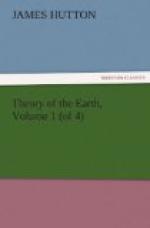But do not let us lose sight of our proper subject, by examining things foreign or not so immediately to the purpose. We are only inquiring if those flattened spheres of native manganese had been formed by water, or if it were by fusion; for, our author agrees that there is no other way. Why then does he endeavour to evade giving a direct answer, and fly away to consider the quantity of the product, as if that had any thing to do with, the question, or as if that quantity were not sufficient, neither of which is the case. In short, our author’s whole observation, on this occasion, looks as if he were willing to destroy, by insinuation, the force of an argument which proves the theory of mineral fusion; and that he wishes to render doubtful, by a species of sophistry, what in fair reasoning he cannot deny.
Our author has written upon the subject of phlogiston; one would suppose that he should be well acquainted with inflammable bodies at least; let us see then what he has to observe upon that subject. He quotes from my Theory, that spar, quartz, pyrites, crystallised upon or near each other, and adhering to coal, or mixed with bitumen, etc. are found; circumstances that cannot be explained in the hypothesis of solution in the moist way.—He then answers;—“Not exactly, nor with certainty; which is not wonderful: But they are still less explicable in the hypothesis of dry solution, as must be apparent from what has been already said. How coal, an infusible substance, could be spread into strata by mere heat, is to me incomprehensible.”—It is only upon the last sentence that I am here to remark: This, I believe, will be a sufficient specimen of our author’s understanding, with regard at least to my Theory which he is here examining.
The reader will see what I have said upon the subject of coal, by turning back to the second section of the preceding chapter. I had given almost three quarto pages upon that subject, endeavouring to explain how all the different degrees of infusibility were produced, by means of heat and distillation, in strata which had been originally more or less oily, bituminous, and fusible; and now our author says, that it is incomprehensible to him, how coal, an infusible substance, could be spread into strata by mere heat.—So it truly may, either to him or to any other person; but, it appears to me almost as incomprehensible, how a person of common understanding should read my Dissertation, and impute to it a thing so contrary to its doctrine.
Nothing can better illustrate the misconceived view that our author seems to have taken of the two opposite theories, (i. e. of consolidation by means of heat, and by means of water alone,) than his observation upon the case of mineral alkali. To that irrefragable argument (which Dr Black suggested) in proof of this substance having been in a state of fusion in the mineral regions, our author makes the following reply;




